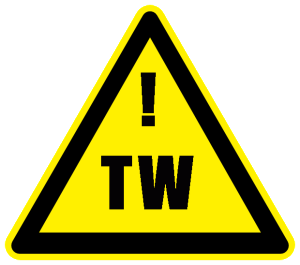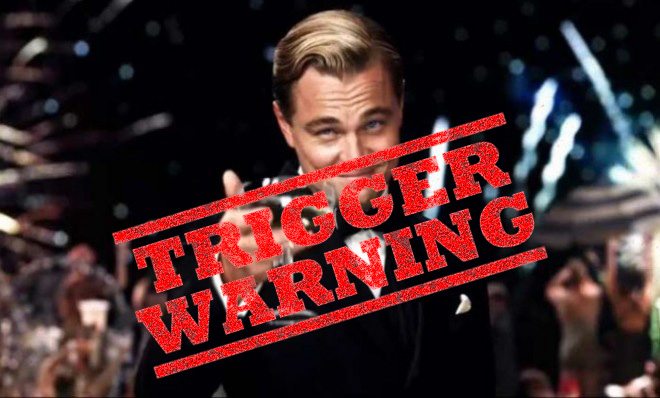Should course reading come with a trigger warning?
[dropcap]B[/dropcap]ooks are designed to evoke an emotional response, but what happens when this response is too severe? For some readers, sensitive topics can be more than just upsetting: they can trigger a dangerous response. In light of this, several American colleges have recently received requests for ‘trigger warnings’ to be placed on syllabus texts.
Typically used on blogging platforms, particularly in feminist spaces, trigger warnings are brief verbal alerts to warn reader of any potentially sensitive issues that are about to be discussed. The idea behind this is that a person who has undergone a traumatic experience – particularly someone with PTSD – may have a negative emotional response to certain stimuli or ‘triggers’ which remind them of the it. The presence of a trigger warning, therefore, means that people can decide in advance whether they feel comfortable with an issue, and allows them either to prepare mentally or to remove themselves from the discussion.
As students at Rutgers University in New Jersey and Oberlin College in Ohio have pointed out, the works studied in English and Comparative Literature courses often address sensitive and personal issues, making them rife with potential triggers. Some commonly-cited examples are The Great Gatsby, which might require warnings for misogynistic violence and abuse; Mrs Dalloway, which would merit a warning for suicidal ideation; and The Merchant of Venice, with a warning for Anti-Semitism. A similar movement at the University of California in Santa Barbara recently saw the student senate make a formal call for professors to place trigger warnings on class content – although this wasn’t specific to literature, it’s clear to see that a shared ideological background is at work.
Despite the apparent logic of trigger warnings, these suggestions have been met with criticism and even outrage from media sources. Opponents have dismissed the idea of placing trigger warnings on literature as being reductive, absurd, and even an act of oppression. The right to freedom of speech has been repeatedly invoked, and parallels have been drawn to the regime of self-censorship in Orwell’s 1984. For some reason, the seemingly-harmless request for more measures to accommodate at-risk students apparently has personally offended multiple article writers. Which begs the question: why?
 The first common complaint is that trigger warnings are reductive, that they could damage interpretation of a work. A novel cannot be condensed, say the critics, to a handful of topics; for example, The Hunchback of Notre Dame is about more than just Antiziganism and death. If a student goes into it expecting only these topics, then every other feature of the work will be consequently obscured.
The first common complaint is that trigger warnings are reductive, that they could damage interpretation of a work. A novel cannot be condensed, say the critics, to a handful of topics; for example, The Hunchback of Notre Dame is about more than just Antiziganism and death. If a student goes into it expecting only these topics, then every other feature of the work will be consequently obscured.
However, this argument fails to convince me personally. For a start, trigger warnings aren’t nearly as obtrusive as this would suggest. In fact, if you’re not looking for them, it can be easy to forget their presence. When you watch a film at the cinema, doesn’t it have an age rating certificate which warns you which aspects of the film have caused that classification? The warning lasts a matter of seconds, and hardly hinders those who have no need of it. Placing warnings on syllabus texts needn’t be any more invasive. Furthermore, it can probably be assumed that anyone willing to slog it through a work of classic literature will have a high enough level of reading comprehension to assess the text, in spite of any prejudices that a trigger warning might allegedly bring.
[pullquote style=”left” quote=”dark”]It may sound absurd to put obvious warnings on well-known works.[/pullquote] Another grumble popular with the critics is that placing trigger warnings on books will lead to a ‘snowball’ effect. ‘Where does it stop?’ they ask. Should we place a warning on Macbeth for murder? On Lolita for paedophilia? How about Jane Eyre, for the demonisation of mental illness and for child abandonment? Quite simply, yes. Even using warnings for uncommon triggers has the potential to prevent someone from suffering a damaging emotional episode then surely it’s worth the mild inconvenience?
‘But education is meant to challenge students,’ yet more opponents have argued. ‘Literature is supposed to push you out of your comfort zone.’ Perhaps this is true, but there is a definite difference between being challenged and being sent into a damaging emotional state by the reawakening of past trauma.
Trigger warnings aren’t some easy get-out clause that allows people to avoid discussion of difficult topics; they’re a safety device. Moreover, although challenging students is an important aspect of a university course, ensuring their mental well-being and personal safety should take priority. I applaud any institutions which implement trigger warnings in response to these requests, and would be pleased to see Warwick one day do the same.
[divider]

Should Warwick introduce trigger warnings for their reading lists?
Have your say @boarbooks #triggerwarnings

Comments